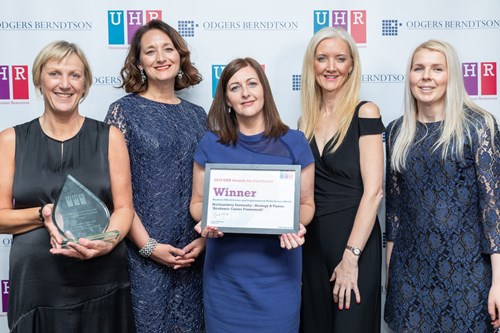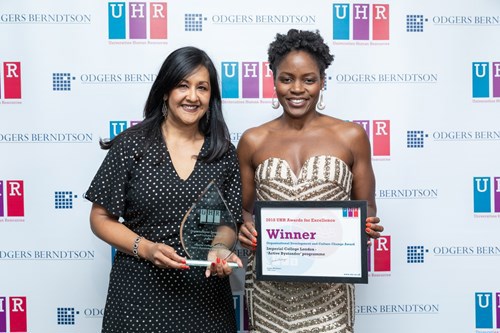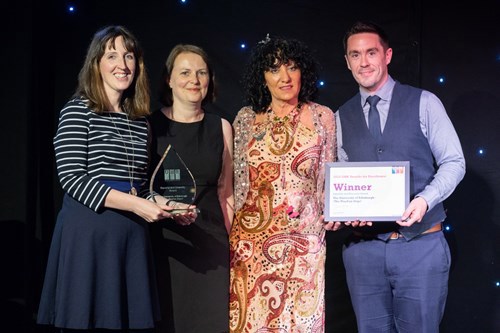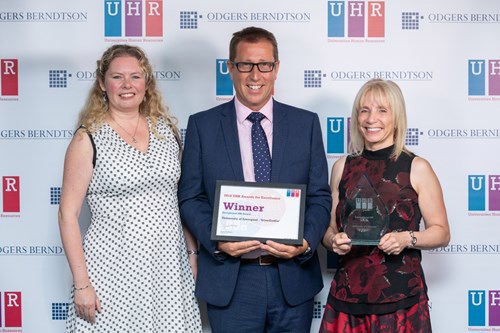A key UHR aim is to enable HR innovation and learning from each other, and to build our professional skills base: these awards give a great opportunity to do this, and highlight creativity and success. We want to show the sector and the HR professionals beyond HE that our HR practitioners introduce cutting edge and impactful practices which enhance organisational culture and performance within UK universities.
It’s a great opportunity to encourage and motivate the HR team, even in preparing an entry – and even more so if you win. The publicity that follows from winning these awards is also incredibly valuable, and entries often feature in national events and publications about effectiveness and good practice in the sector.

Northumbria University’s vision is to be known as “a research-rich, business-focused, professional university with a global reputation for academic excellence”. To achieve this, it needed a clear plan to support its academic staff and encourage them to greater heights.
The University established an Academic Career Framework that would help it attract and retain “inspiring, research-excellent and entrepreneurial” academics. The framework helped it establish clear pathways for career development, introduce new leadership structures, and support academics on their path to doctoral qualification. It also facilitated a generous financial support package to encourage global academics to join Northumbria.
Since 2013/14, just over 600 new academics have joined, while the number of doctorally-qualified staff has jumped by 90 to 702. The University leaped from 80th to 50th in the Research Excellence Framework 2014, the biggest rise in research power of any university. Academics have also secured twice as much research grant money over the last four years.
The framework is part of a range of initiatives in its Vision 2025 plan, which aims to make Northumbria one of the Top 30 universities in the UK.
Runner Up in the Business Effectiveness and Organisational Performance category
In 2015, Liverpool John Moores University set up the Leadership and Development Foundation (LDF). The LDF was designed to send a signal that the University was committed to supporting and developing its staff.
This commitment took various forms. The LDF quickly introduced the Professional Services Conference and the Professional Services Excellence awards, recognising exceptional staff. The conference now attracts more than 300 delegates, and staff have stated that it makes them “feel proud to work at LJMU”.
The University also became the first post-92 institution to receive the Mark of Excellence from the Association of University Administrators. 100 AUA memberships were purchased by the LDF, giving participants a chance to develop their knowledge and professional network. LJMU now has 39 fellows and five accredited members, with 11 submissions being processed. The LDF also encouraged all faculties and divisions to assess themselves against criteria for the Customer Service Excellence awards, which promotes customer insight, quality and culture. The University is the first in the North West to have achieved full institutional recognition by CSE, and have gained 40 "compliance plus" ratings.
These initiatives support the University’s strategic objectives, such as ensuring that staff “feel valued and supported”. The latest staff survey indicates that 97% of People and Organisational Development staff said they really cared about doing well in their job, while 75% said the organisation inspired them to do their very best.
Shortlisted in the Business Effectiveness and Organisational Performance category
A third of SOAS’ headcount is made up of part-time, hourly-paid teachers. This is why the institution was keen to improve their experience, and the processes it used to pay and employ them.
Complex contracts and processes had resulted in errors and omissions in contracts and payments, as well as a lack of transparency. SOAS embarked on a “transformational project”, overhauling its payment and contract processes, and identifying a suitable replacement IT solution. The new approach has reduced queries to HR by over 50% and reduced the average time to resolve queries from 40 days to 13.
Staff say the system is now easier to use, with “significantly reduced errors” and easy-to-understand processes. This academic year, 746 contracts and variations have been automatically generated. Previously, the manual system took around 30 minutes per contract.
SOAS is now exploring extending the system to irregular employees such as student ambassadors and invigilators.
Shortlisted in the Business Effectiveness and Organisational Performance category
Driving up the performance of the University is a key strategic focus for Staffordshire University, as well as boosting student satisfaction levels and improving student experience. As a result, the HR and Corporate Information teams collaborated on the development of the Performance and Development Review scheme last year.
The PDR scheme is a performance-based appraisal scheme which combines several data sources to give staff insight into factors including:
- Grades and pass rates in their modules
- Research outputs and external income secured
- Training and development undertaken
Staff review the data on a dashboard ahead of their discussion with an appraiser and reflect on their own view of their performance. This provokes a more focused conversation about achievements, as well as aims for the future.
Employees then receive an annual end-of-year performance rating, and the University holds quarterly business reviews where Deans communicate the performance of their schools to executive members.
These rating scales have enabled the University to identify rising stars, potential skills gaps, and staff that have specific needs. It has also been able to assign funding for staff development more confidently.

Imperial’s Active Bystander training has been developed to give staff the skills to challenge and combat unacceptable behaviour in the workplace. So far, around 1,000 staff have attended the hour-long interactive sessions, and it has been featured on LBC radio and Channel 5 news.
A 2014 University-wide survey raised concerns around bullying and harassment in the institution. In response, the University set up tailor-made training designed to encourage staff to speak out and address issues. The campaign also featured a “hotline” to an external Employee Assistance Provider so employees could raise concerns.
The sessions address issues such as bullying, but also the impact of “micro-inequities” such as eye-rolling at meetings, constantly interrupting others, and taking more questions from men than women. 78% said they found the content “very helpful”.
The initiative was originally launched in the Faculty of Engineering but is now being rolled out across all faculties and staff. The next phase is to roll out training to the student body, and a pilot session has already been run for PhD students.
Runner Up in the Organisational Development and Culture Change category
Birmingham’s Coaching Academy is designed to be a “highly valued and respected provider of one-to-one executive level coaching for University colleagues at senior levels”. It is now in its fourth year and features 35 accredited coaches.
Since 2016, a number of changes have been put in place in a bid to establish the academy as a best-in-class coaching service in the HE sector. These improvements have resulted in an increase in senior clients taking up coaching, and academics recognising the value of coaching on research and teaching.
Improvements include the introduction of a more systematic coaching process, and clearer tracking of how the sessions have benefitted the individual and organisation. Two senior directors have also been recruited to advocate for coaching in the University, and services have been promoted through word of mouth, intranet pages, brochures and the HR business partner network.
Between 2016 and 2018, 200 coaching assignments were completed, a significant increase on the 21 completed between 2014 and 2016. The academy has helped raise awareness internally that coaching is open to all staff rather than just a small group of senior employees.
Shortlisted in the Organisational Development and Culture Change category
At the University of Huddersfield, the ethos is that “if you stop growing, the University stops growing”. That is why Vice Chancellor Bob Cryan put himself through the Chartered Management Institute’s chartered manager process in 2017, even after ten years in the post. He benefitted from the experience so much that he asked the University’s executive team to do the same.
The University is now aiming to put all of its leaders and managers through the process. The idea is to ensure that great leadership and management is in place at all levels in the institution, and that these leaders will help staff fulfil their potential.
The majority of senior managers are currently undertaking a CMI Level 7 Strategic Leadership Programme, and will attain chartered manager status by June 2018. A further 120 middle managers have also started the process, with the remaining 150 or more first line managers due to begin in early 2019.
This work will continue even after this status has been achieved. Leaders and managers will be asked to adopt the “Team Hud Way”, which encourages them to ask honest questions, such as: “If you applied for your job today, would you be shortlisted?”. The HR department is also working on other initiatives, such as a joint coaching pool with the University of Leeds and Sheffield Hallam University, and a talent management and succession planning process.
Shortlisted in the Organisational Development and Culture Change category
In 2013/14, the University’s Head of Organisational Development made a discovery. Due to the lack of a coaching lead, the Leeds and York Partnership NHS Foundation Trust (LYPFT) had qualified coaches who were not actively coaching. As a result, she met with more than 10 local public-sector organisations to propose a citywide coaching network.
The Leeds Citywide Coaching Network consists of Leeds Beckett University, Leeds City Council, and the LYPFT. Prior to its foundation, these organisations had all developed separate coaching strategies. Now they collaborate to develop leadership talent across the city, and use resources more effectively.
Each partner has agreed to a minimum of 20 qualified coaches, and has the option to “swap” coaches to spark activity and reduce costs. More than 300 hours of coaching practice has taken place since the network was formed, saving partners approximately £600,000 in coaching rates. Participants also praised the coaching as “invaluable” in providing “significant learning”.
The network has already been approached by other organisations such as the University of Leeds and West Yorkshire Police, with a view to being involved. The model itself has been presented at various conferences, in locations from Imperial College London to Bournemouth, Nottingham and Perth in Scotland.

In the IT sector, men outnumber women by a ratio of more than 2:1. In a bid to diversify its workforce, the University of Edinburgh conducted a gender equality survey. This simple survey evolved into a full staff development programme which has increased the number of women in director roles by 300% in three years.
The PlayFair Steps initiative explores how factors such as a person’s age, race, ethnicity, gender, religion, background or sexual orientation affect their working experience at the University. It consists of a lecture series and an Equality Working Group, and is evaluated based on:
- Data-driven decision making and reporting
- Myth-busting
- Staff engagement
- Visibility and accountability
The University invited 10 academics from fields such as gender studies, social policy and education to present and make recommendations to the Information Services Group. In addition, the working group was set up to give staff a chance to voice issues, and changes were made to the way the University promoted roles in order to make them more inviting and inclusive.
The initiative has also had a direct effect on policy internally. All staff involved in recruitment are now required to take part in unconscious bias training. Furthermore, between October 2016 and February 2017, more than 44.5% of staff have participated in some form of equality or diversity training.
Runner Up in the Equality and Diversity category
When GCU analysed its internal data, it discovered that while 55% of its academics were female, they tended to be in more junior positions. It embarked on a project that would address this imbalance, tackle the gender pay gap, and encourage culture change.
It engaged with a wide range of staff to identify challenges, and established a steering group to analyse data. In addition, it pushed managers to develop their understanding of equality and diversity, introduced new recruitment and working processes, and supported 70 female staff through leadership training. It also worked with campus trade unions to undertake equal pay reviews.
It subsequently reduced its gender pay gap for academic staff from 8.2% in April 2015 to 4.2% in July 2017. Its overall gender pay gap tightened from 18.3% in 2013 to 14.5% in 2017. It also increased the number of female professors from 25% in 2012 to 40% in 2018.
In 2017/18, GCU was one of a handful of universities with a female Chancellor, Chair of Court, Vice Chair of Court and Vice Chancellor.
Shortlisted in the Equality and Diversity category
In November 2017, Aberystwyth University’s Equality and Diversity team launched the first in a series of conferences. All Our Trans Tomorrows is the first of its kind in Wales – an annual conference featuring keynote speeches and workshops from transgender activists and academics.
The conferences are free to delegates, and many attendees at the first event were primary and secondary school teachers and individuals working within social care. Delegates said that the University had provided valuable education and resources to help inform them about transgender issues. The event was also well attended by University staff and students.
A post-event survey revealed that 67% rated the conference as excellent, and another event is already being planned for October 2018.
All Our Trans Tomorrows is just one element of the University’s wider equality strategy. In the last two years, Aberystwyth University has risen more than 200 places in the Stonewall Workplace Equality Index. It has since been voted the 56th best employer in the UK for LGBT staff members in a field of 400.

The University of Liverpool is one of the major employers in a city where unemployment is higher than the national average. Working with local social enterprise Transform Lives Company, it launched the GiveGetGo initiative in 2016 to help those who are furthest from the labour market.
The University offers volunteering roles on campus one or two days a week, while staff have been trained as mentors. Participants receive support with interview practice, job searches, one-to-one coaching and access to other health and personal development opportunities.
The University has since helped 39 long-term unemployed locals, who had previously found their route to a job blocked by criminal records, health conditions, outdated work skills and histories of addiction. 18 are now working as a direct result, while eight are in further training. The wider GiveGetGo project has assisted 75 people in the city, with 32 going on to find work.
GiveGetGo has been rolled out into 22 different departments including HR, finance, music and student support.
Runner Up in the Exceptional HR category
In 2017, Canterbury Christ Church University delivered the first phase of an ambitious project to integrate HR, Staff & Organisational Development, Payroll and Finance data into a single digital platform and offer all staff and managers simple, efficient, technology-enabled processes which maximise self-service where possible.
Led by the HR Project Team, ‘StaffSpace’ was delivered collaboratively by teams in HR, Finance, Payroll, and Staff Development with significant engagement with the workforce.
For the University, StaffSpace offers a single source of staff data, better intelligence and valuable people analytics. For employees, it offers simple and intuitive self-service and enables them to take control of their own development and data.
In preparation for the first phase going live, the project team collected data on the working patterns of every employee so that attendance could be personalised. StaffSpace allows all people data to be managed online, moving away from paper-based methods, saving time, preventing duplication and improving data authenticity.
Phase two of the project (2018 to 2020) will see the addition of recruitment, contract changes, appraisal, talent and succession come online. StaffSpace is a key enabler of the University’s ambitious People Strategy.
Shortlisted in the Exceptional HRcategory
Apprentices are employed in 11 of the University of Exeter’s colleges and professional services, across three campuses and two counties. Prior to the introduction of the Apprenticeship Levy in May 2017, the People Services department has been working on integrating them into the wider workforce.
Apprentices gain valuable on-the-job training and develop technical knowledge and transferable skills that will help them in their career. They also provide benefits for universities, who can draw on their enthusiasm to improve productivity, and provide staff with professional development opportunities.
Exeter has assigned mentors to apprentices, and given them access to staff benefits such as in-house training, library services, and the employee recognition scheme. A dedicated website, blog and social media have been set up, while competitive apprenticeship salary scales have been integrated into the University’s pay scales.
The number of apprentices at the University has increased over 200% from 13 in 2016/17 to 43 in 2017/18. They are employed across many different fields, from engineering to administration, IT, leadership, management and digital marketing. The new approach is more holistic, open to new and existing staff, and offers greater support to both apprentices and recruiting managers at all stages of the process.
Shortlisted in the Exceptional HR category
A 2014 survey of Leeds Trinity staff clearly stated that people wanted well-being to be high on the University’s agenda. The University’s response started with the launch of a centralised portal, and expanded into a range of community events and initiatives.
Leeds Trinity was one of the first Universities to implement the “Juice” platform, an employee-driven “hub” for well-being activities launched by Sheffield University and co-founded by Leeds Trinity alumnus Gary Butterfield. Since the launch, a range of activities have followed, including a series of “Learning Lunches” on topics such as nutrition and mental health, regular health checks, and fitness centre sessions on Tai Chi and mindfulness. These activities are free to employees, and can be done in work time.
In December 2017, employees, students and community members collected more than 130 presents as part of “Mission Christmas”, helping disadvantaged children in West Yorkshire. In April this year, 16 employees climbed the Three Peaks in Yorkshire to raise funds for the Inspiring Futures charity.
The October 2017 staff survey produced a 13% increase (from 56% to 69%) of staff who believed the University was effective in supporting well-being. The University has managed to achieve these results on an “extremely limited budget” by engaging with internal experts, alumni and external partnerships.
A team of key people with experience and knowledge of good people management practices within and beyond higher education, including:
The awards were presented at our UHR annual conference in Bristol, on the evening of 24 May, during the conference gala dinner. Our theme for the conference was Universities: competitive advantage or collective advancement?
The 2018 UHR Conference focused on the people management implications of identifying opportunities for competitive advantage and distinctiveness in our own institution’s mission, whilst recognising the value of collaboration as a sector in responding to common opportunities and threats. This set the context for the 2018 awards.